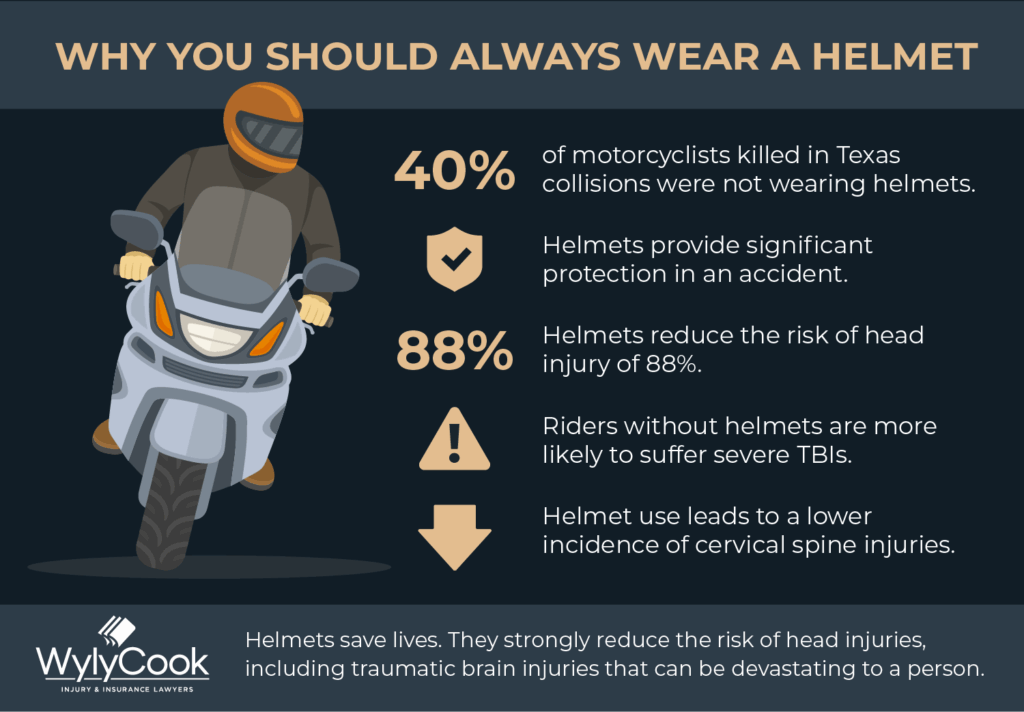Key Takeaways
- In Texas, riders under 21 must always wear a helmet.
- Riders 21 and older can ride without a helmet if:
- they complete a motorcycle operator training safety course; or
- have health insurance.
- Not wearing a helmet when required can result in fines of between $10 and $50.
- Not wearing a helmet, whether required by law or not, will impact compensation claims made by injured riders.
- Helmets significantly reduce the risk of severe head injuries and are essential for both physical safety during a motorcycle wreck as well as seeking fair compensation after a motorcycle accident.
Let's Go Beyond, to Bring You Back
Let's get you the compensation you're entitled to. Get a FREE Consultation today.
Let's Go Beyond, to Bring You Back
You deserve the compensation you’re entitled to, call for your FREE Case Review today.
Texas Motorcycle Helmet Laws Explained
The law in Texas generally requires operators and passengers of motorcycles to wear helmets. The law also requires that operators of motorcycles require their passengers to wear helmets, just like drivers of cars must require their passengers to wear seatbelts. But these general rules have a giant exception that allows many, if not most, riders over 21 to ride without a helmet legally.
First, the exceptions are limited to riders 21 years old and over. Kids, and even adults between 18 and 20, must always wear a helmet. And the operator of a motorcycle may not transport a passenger without a helmet if the law requires a helmet. So taking your underage child for a helmetless ride means you’ve broken the law.
The first exception allows riders (aged 21 and up) to ride legally without a helmet if they have completed a motorcycle operator training and safety course. The course must comply with the rules set out to ensure that the training is sound and legitimate.
The second exception allows riders (again, aged 21 and up) to ride without a helmet if they are covered by health insurance that will pay for “medical or surgical expenses incurred as a result of a collision.” (Tex. Trans. Code § 661.003(i)).
Understanding these nuances in Texas motorcycle helmet law is vital. Whether you choose to wear a helmet or not, being informed about the requirements is crucial for both legal compliance and personal safety.
Legal Consequences for Not Wearing a Helmet in Texas
Not wearing a helmet when required by Texas law (or transporting a passenger without a helmet) can result in criminal fines. Violating the helmet law is a misdemeanor and punishable by a fine of between $10 and $50. While the fine is modest, this remains a criminal offense.
Besides these financial penalties, there are significant legal and financial consequences to operating a motorcycle without a helmet. In a motorcycle crash without a helmet, claims will likely arise that your injuries were worsened due to non-compliance with helmet law, impacting your ability to receive full compensation and complicating your legal situation.
How Helmets Impact Your Safety and Accident Compensation

The benefits of wearing a helmet extend beyond physical safety. In Texas, not wearing a helmet can affect your accident compensation claims. If found partially responsible for your injuries due to not wearing a helmet, your compensation may be reduced. Juries and insurance companies, with the benefit of hindsight, often view not wearing a helmet as negligence, complicating your claims.
Navigating the legal landscape after a motorcycle accident can be challenging, especially with biases against motorcyclists. Insurance adjusters and juries may perceive your case differently due to these biases. Hiring a motorcycle accident lawyer can be crucial; experienced attorneys understand the specific legal issues that arise and can effectively advocate for your rights and compensation under the law.
In summary, wearing a helmet protects your physical well-being and plays a significant role in your legal and financial safety. The consequences of not wearing a helmet are far-reaching, affecting your health and ability to claim compensation after an accident.
Helmet Standards and Replacement Guidelines
The Texas Department of Public Safety sets minimum safety standards for motorcycle helmets. Ensure your helmet meets these standards by checking for a label with the letters DOT, followed by FMVSS No. 218, and the word CERTIFIED. This label signifies conformity to federal safety standards, offering necessary protection.
A helmet should fit snugly and fasten securely to be effective. An ill-fitting helmet can compromise safety, so choosing the right size and style is crucial. Regular checks and adjustments are recommended to maintain a proper fit.
Manufacturers recommend replacing your motorcycle helmet every five years. Factors like UV exposure and regular wear and tear degrade the helmet’s materials, reducing effectiveness. Following these replacement guidelines ensures your helmet continues to provide maximum protection.
Why You Should Always Wear a Helmet
Put simply, helmets save lives. And they strongly reduce the risk of head injuries, including traumatic brain injuries that can be devastating to a person.
- 40% of motorcyclists killed in Texas collisions were not wearing helmets.
- Helmets reduce the risk of head injury by 88%.
- Helmets provide significant protection in an accident.
Riders without helmets are more likely to suffer severe traumatic brain injuries, leading to higher rates of hospitalization and ICU admissions. These injuries can have long-lasting effects on health and quality of life. Wearing a helmet is a proactive step towards protecting yourself and your family from these tragic outcomes.
Helmet use is also associated with a lower incidence of cervical spine injuries in motorcycle accidents. The cervical spine is the part of the spine from the neck to the head. Injuries to the cervical spine can cause permanent paralysis of the arms and legs by damaging the spinal cord, cutting off the brain’s ability to feel or control the body.
Steps to Legally Ride Without a Helmet in Texas
If you are over 21 and wish to ride without a helmet in Texas, you must follow specific steps. Completing an approved motorcycle safety course, which provides essential training and knowledge, is one way to ride legally after you have completed a motorcycle safety course.
Alternatively, having a health insurance plan that covers motorcycle accident injuries qualifies for a helmet exemption and is the only exception that is legally exempt. This insurance coverage must explicitly cover injuries sustained in motorcycle accidents to be valid.
Meeting these conditions allows you to legally ride without a helmet, by taking the minimum responsible measures to protect your own safety in accordance with state law.
Houston Motorcycle Accident Lawyer
Get Compensated For Your Injuries & Damages! Call Us For A FREE Case Review And Know What Your Case Is Worth.
Speak to a Motorcycle Accident Lawyer for Legal Support
Being involved in a motorcycle accident can be life-altering, and seeking legal support is crucial for navigating the recovery process. Motorcycle accident claims can potentially yield significant compensation, especially in cases involving negligence from other drivers. An experienced attorney can help you understand your rights and advocate for the compensation you deserve.
Finding the right lawyer is essential. Look for attorneys experienced in motorcycle accident cases who can effectively present your case and prove the other party’s negligence. Many motorcycle accident lawyers offer a free consultation, allowing you to discuss your case and determine the best course of action.
Frequently Asked Questions
What are the helmet laws for riders under 21 in Texas?
In Texas, riders under 21 must wear helmets at all times while operating or riding a motorcycle.
How can riders over 21 qualify for a helmet exemption?
Riders over 21 can qualify for a helmet exemption by either completing an approved motorcycle safety course or having health insurance that specifically covers motorcycle accident injuries.
What are the penalties for not wearing a helmet in Texas?
Not wearing a helmet in Texas is a criminal misdemeanor that can result in a fine of up to $50.
How often should motorcycle helmets be replaced?
Motorcycle helmets should be replaced every five years to maintain optimal safety and protection. Regularly checking for signs of wear or damage is also crucial.
Why is wearing a helmet important for motorcycle riders?
Wearing a helmet is crucial for motorcycle riders as it significantly reduces the risk of death, serious head injuries, and cervical spinal injuries. Wearing a helmet prevents an insurer arguing you should be responsible for the severity of your injuries after a crash because you weren’t wearing a helmet.
Related Article(s)
Understanding High-Side Motorcycle Crashes: Causes and Prevention Tips
Houston, TX – Fatal Motorcycle Crash on Southwest Freeway Service Road



